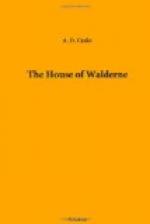“All the blame, if blame there was, my lord.”
“If blame there was! Surely thou art mad, boy! and thy back will verify the force of Solomon’s proverb, a rod for the fool’s back, unless thou change thy tone and ask pardon of my good brother.”
“My Lord of Warwick, I am very sorry that I was forced to kill your good hound, and hope you will forgive me.”
“Forced to kill!”
“If I had not, he would have killed the poor doe and her fawn together, and I could not have seen that, if I had to hang for it, as the noble earl threatened I should.”
“Tell me the whole story,” said the Earl of Leicester.
“Pardon me, my good brother, I want to hear how he defends himself.”
And Martin began:
“We were in the woods, when we heard a great rustling, and saw a doe crossing the path, very frightened, but for all that she kept stopping and looking back, and we saw a little fawn by her side, who couldn’t keep up; then we heard the hound baying behind, and the poor mother trembled and started, but wouldn’t leave her little one, but bleated piteously to the wee thing to make haste. I never saw an animal in such distress before, and I could not bear it, so I stood in the track to stop the dog, and he rushed upon my spear. I was very sorry for the good hound, but I was more sorry for the doe and her fawn.”
“And thou wouldst do the same thing again, I suppose?” said the Earl of Leicester.
“I couldn’t help it.”
“And what didst thou do, Hubert?”
“I tried to stop him, but I couldn’t.”
“Thou didst not feel the same pity, then, for the deer?”
“No, my lord, because I thought dogs were made to hunt deer, and deer to be hunted.”
“Thou art quite right, my lad,” said he of Warwick, “and the other lad is a simpleton—I was going to say a chicken-hearted simpleton, but he was brave enough when his own neck seemed in danger, nor does he fear much for his back now—
“What dost thou say, boy?”
“My lord, if I have offended you, I refuse not to pay with my back.”
“Get ready for the scourge, then,” said the earl his lord, half smiling, and evidently trying his courage, “unless thou wilt say thou art sorry for thy deed.”
“I am ready, my lord. I would say anything I could say without lying, rather than offend thee, but what am I to do? Let me bear what I have to bear.”
“Nay,” said the earl, “it may not be. My brother of Warwick, canst thou not forgive him? I will send thee two good hounds in the place of poor Bruno. Dost thou not see the lad has sat in the school of Saint Francis, who pitied and loved everything, great and small, as Adam de Maresco, my good friend at Oxford, tells me, and so all God’s creatures loved him, and came at his call—the birds, nay, the fishes?”
“Dost thou believe all this, my boy?” said he of Warwick.
“Yes, it is all true, is it not? It is in the Flores Sancti Francisci.”




